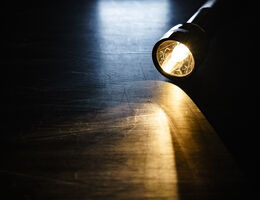
June 19, 2025—Summer power outages are becoming more common—and more dangerous. Losing electricity during hot weather can put your health at risk. But a little preparation today can help you stay safe when the power goes out. Start with this advice from the American Red Cross, FEMA and other experts.
Beat the heat
When the air conditioner stops working, overheating becomes a serious concern. Stay cool by wearing lightweight and light-colored clothing. You can also take cool showers or baths.
If your home becomes dangerously hot, don't wait—head to a cooling center. Or spend time in an air-conditioned public space, like a library or mall.
A word of warning: Don't rely solely on fans. They may not prevent heat illness when temperatures soar.
Protect your food
During a power outage, keep the refrigerator and freezer doors shut. A closed fridge can keep food cold for about four hours. A full freezer can hold a safe temperature for up to 48 hours.
Use appliance thermometers to track temps and get rid of perishable items that linger above 40 degrees Fahrenheit for four hours or more.
To get ready for longer outages, keep a cooler handy, and have some ice ready to put in it.
Keep in touch
You need a charged cellphone to get emergency alerts and stay in contact with friends and family. Power banks or backup chargers can help keep your phone working if the power stays out. A battery-powered radio is also a good way to stay informed.
Plan for medical needs
Some medications, like insulin, need refrigeration. Ask your healthcare provider how long these can safely stay at room temperature. Keep a cooler, ice packs and a thermometer on hand to help keep these meds at the right temperature. Be careful not to freeze insulin.
People who rely on medical devices, including CPAPs, oxygen concentrators or hearing aids, should have at least one backup plan to power them. Ask your doctor for advice on how to handle an outage—and when to evacuate or call for help.
A backup power source like a spare battery, rechargeable power station or generator can be helpful. If you have a generator:
- Follow all product instructions.
- Make sure you have a carbon monoxide detector on each floor of your house.
- Never use the generator indoors or within 20 feet of a door, window or air vent.
If you depend on electricity to power key devices, contact your utility company now. Ask about priority services in case of an outage.
Stock your supplies
Taking time to prepare now can help you and your loved ones stay safe and comfortable the next time you lose power.
Flashlights are safer than candles and help preserve phone batteries. Store one where you can find it during an outage. And check now to make sure your household's emergency kit is stocked and ready to use.
Sources
- American Academy of Family Physicians. "How to Survive an Extended Power Outage With Home Medical Equipment." https://familydoctor.org/how-to-survive-an-extended-power-outage-with-home-medical-equipment/.
- American Lung Association. "Preparing for a Power Outage as a Medical Device User." https://www.lung.org/blog/power-outage-preparation.
- American Red Cross. "Power Outage Preparedness Checklist." https://www.redcross.org/content/dam/redcross/get-help/power-outage/EN_Power-Outage-Safety-Checklist.pdf.
- Centers for Disease Control and Prevention. "What to Do to Protect Yourself During a Power Outage." https://www.cdc.gov/natural-disasters/response/what-to-do-protect-yourself-during-a-power-outage.html.
- Federal Emergency Management Agency. "Prepare Yourself for a Power Outage." https://www.fema.gov/blog/prepare-yourself-power-outage.
- Ready.gov. "Be Prepared for a Power Outage." https://www.ready.gov/sites/default/files/2024-03/ready.gov_power-outage_hazard-info-sheet.pdf.
- U.S. Food and Drug Administration. "Food and Water Safety During Power Outages and Floods." https://www.fda.gov/food/buy-store-serve-safe-food/food-and-water-safety-during-power-outages-and-floods.